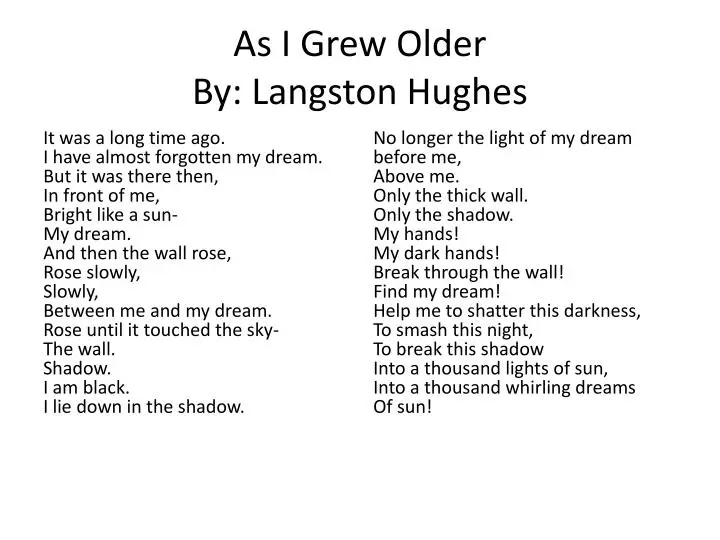
I believe the message of this poem is that children should not let anything or anyone get in the way of their dreams. Throughout a person’s lifetime it seems as if growing up means letting go of dreams and expectations. Over and over we hear “Oh that profession doesn’t make any money, are you sure you want to do that?,” “do something you love and you’ll never work a day in your life”(because likely that field isn’t hiring), “don’t waste your time pursuing that the amount of schooling and debt isn’t worth it” and many more heart breaking quotes from people. But what do these people know? Are they professional? For the most part, No, they are not professionals nor have experience in the field you want to be a part of. So why do we let these opinions get in the way of us continuing to pursue our dreams?
Langston Hughes uses imagery and metaphors to illustrate this phenomenon. The two main metaphors in the poem are the “sun” (line 5), which represents the dream and the “wall” making its first appearance in line 7 represents “realistic expectations” and societal influences. I believed the sun stands for a dream because everyone knows that the sun is so bright, sometimes even blinding which makes it hard to ignore. Its purpose is so vital to life that it can also not be forgotten. However, sometimes its importance can be taken for granted. What I mean is that do we always value the sun’s job? Or is it only on cloudy, rainy days that we take the time to acknowledge how much we need it and miss it? So just like the sun’s purpose, if not acknowledged life can pass you by while your dream sits in the corner collecting dust and waiting to be fulfilled. The wall stands for societal influences because it rises up and casts a shadow on the sun, just as money, parents, opinions and competition can cast negative light on our dreams.
He starts off the poem by stating, “ I have almost forgotten my dream” which shows how easy it is to let other things get in the way of your dreams and let a memory be forgotten. But he illustrates that you have the power to keep it alive if you acknowledge that dream by stating “But it was there then, in front of me.” He describes the wall rising as slow because the first person to make a negative statement about your dream may not affect you, but slowly but surely as the opinions role in one after another they start to chip away at your belief and self-assurance. When he says, “I am black” it shows defeat he let the wall/ society win. The light of his dream is out. Then the poem shifts, in line 21 his hands rise up and break the wall. The wall is broken and the light that was once lost shines proudly and even more bright than before. I believe the sun is brighter now because he states, “a thousand lights of the sun.” It is a common belief that you only miss something when it’s gone. So if you re lucky enough to get it back then you might appreciate it more.

Gianna, Excellent job reading this poem in a way that does justice to the original and makes it meaningful for you and relevant today. That’s exactly what metaphors allow us to do with good poems, understand them both on their own terms and make them our own.
LikeLike